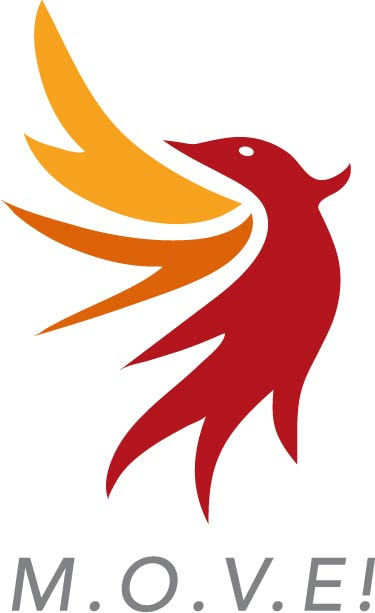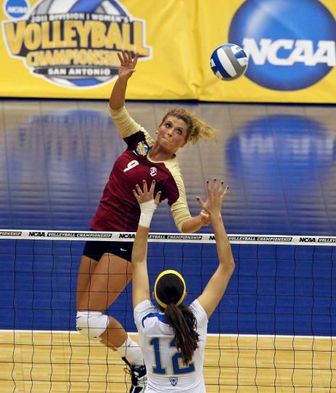Volleyball, Running, and A Masters in Sports and Counseling: ETU!
by Visnja Djurdjevic, M.A., Sports Leadership (Boston College)
With this story – my own -- I write about achieving new athletic goals and how new athletic achievements transform our lives. MOVE! has formed my experience (as a runner and researcher).
I am a former professional and collegiate volleyball player from Serbia. Volleyball always defined who I was, playing a central role in my life. Even though I had to stop playing due to hip and knee injuries, I kept my volleyball identity as a Division I coach at Boston College. I also just completed a masters program in Sports Leadership there. This fall I will be enrolled in a masters counseling program at the University of Nevada in Reno where I will again be coaching volleyball.
Why MOVE! and MOVE! ON Stories:
As I continue coaching and begin a second masters degree focused on sports and counseling, I would like to continue MOVE!research. Sharing my story and hearing yours will help build a community of knowledge.
How I learned about MOVE!
I met Professor U. (as students call her) in a few classes in my master's program at Boston College. She was fantastic. In her classes, I learned about the principles of MOVE! – which included concepts including 10 years, 10,000 hours to excellence, goal achievement theory, theories of success, the physiological bases of habit, neuroplasticity of the brain, emotional intelligence, the value of experimenting, and entering the beginners mind– in two different arenas.
I took four classes (including two independent studies) with Professor U. I was amazed by her level of commitment to each student not only to learn the class material but also and more importantly to guide them through the turbulent times outside of classroom. I can say with certainty (many other of Professor U's students would agree) that she has been my mentor and a life coach during my time at Boston College.
Also, I hired Prof. U. as a coach, joining a MOVE! running/training group. I was looking for a new sport and knew from my studies the many specific physiological and psychological benefits of training. I also started running at a time when the first few months at Boston College were challenging. I was trying to re-prioritize my non-volleyball interests, social activities, and determine my new 'non-volleyball player' identity. In addition to training (intervals, stretch training and strengthening), MOVE! meets for discussion groups on topics related to training.
Goals and ETU: What I Learned From MOVE!
1. Training helped my transition -- it kept me focused on my goals and priorities. It helped me stay positive about any situation I dealt with during my transition. We also learned to challenge ourselves and embrace the uncomfortable (ETU) to maximize our potential. ETU is something I practiced in all aspects of my transition.
2. Having a goal transforms the training experience, accelerating progress by focusing you on your own unique, reasonable goal. I improved beyond what I thought was possible (earlier I thought an ‘old’ knee injury would not tolerate running).
3. Setting a running goal helped me set and achieve academic goals: complete papers earlier than I would have, otherwise, and identify the next direction of my next masters degree. As I got into the habit of writing out weekly training, I became more disciplined about writing down goals for my classes and my team. I thought more strategically about time management.
4. MOVE! has introduced me to a wide range of people of all ages, 20s to late 60s – mothers, all levels of runners – beginners to national champion runners, soccer players, career people of all kinds including doctors, artists, and chief operating officers. Our differences make the group unique and fun. We progress without competing with each other. The stories from others are inspiring – a priceless experience.
5. MOVE! helped me as a volleyball coach. We used parts of the MOVE! method (from the book) for the BC volleyball team, and I'll be applying it at the University of Reno, too. The goal setting helped the players focus.
by Visnja Djurdjevic, M.A., Sports Leadership (Boston College)
With this story – my own -- I write about achieving new athletic goals and how new athletic achievements transform our lives. MOVE! has formed my experience (as a runner and researcher).
I am a former professional and collegiate volleyball player from Serbia. Volleyball always defined who I was, playing a central role in my life. Even though I had to stop playing due to hip and knee injuries, I kept my volleyball identity as a Division I coach at Boston College. I also just completed a masters program in Sports Leadership there. This fall I will be enrolled in a masters counseling program at the University of Nevada in Reno where I will again be coaching volleyball.
Why MOVE! and MOVE! ON Stories:
As I continue coaching and begin a second masters degree focused on sports and counseling, I would like to continue MOVE!research. Sharing my story and hearing yours will help build a community of knowledge.
How I learned about MOVE!
I met Professor U. (as students call her) in a few classes in my master's program at Boston College. She was fantastic. In her classes, I learned about the principles of MOVE! – which included concepts including 10 years, 10,000 hours to excellence, goal achievement theory, theories of success, the physiological bases of habit, neuroplasticity of the brain, emotional intelligence, the value of experimenting, and entering the beginners mind– in two different arenas.
I took four classes (including two independent studies) with Professor U. I was amazed by her level of commitment to each student not only to learn the class material but also and more importantly to guide them through the turbulent times outside of classroom. I can say with certainty (many other of Professor U's students would agree) that she has been my mentor and a life coach during my time at Boston College.
Also, I hired Prof. U. as a coach, joining a MOVE! running/training group. I was looking for a new sport and knew from my studies the many specific physiological and psychological benefits of training. I also started running at a time when the first few months at Boston College were challenging. I was trying to re-prioritize my non-volleyball interests, social activities, and determine my new 'non-volleyball player' identity. In addition to training (intervals, stretch training and strengthening), MOVE! meets for discussion groups on topics related to training.
Goals and ETU: What I Learned From MOVE!
1. Training helped my transition -- it kept me focused on my goals and priorities. It helped me stay positive about any situation I dealt with during my transition. We also learned to challenge ourselves and embrace the uncomfortable (ETU) to maximize our potential. ETU is something I practiced in all aspects of my transition.
2. Having a goal transforms the training experience, accelerating progress by focusing you on your own unique, reasonable goal. I improved beyond what I thought was possible (earlier I thought an ‘old’ knee injury would not tolerate running).
3. Setting a running goal helped me set and achieve academic goals: complete papers earlier than I would have, otherwise, and identify the next direction of my next masters degree. As I got into the habit of writing out weekly training, I became more disciplined about writing down goals for my classes and my team. I thought more strategically about time management.
4. MOVE! has introduced me to a wide range of people of all ages, 20s to late 60s – mothers, all levels of runners – beginners to national champion runners, soccer players, career people of all kinds including doctors, artists, and chief operating officers. Our differences make the group unique and fun. We progress without competing with each other. The stories from others are inspiring – a priceless experience.
5. MOVE! helped me as a volleyball coach. We used parts of the MOVE! method (from the book) for the BC volleyball team, and I'll be applying it at the University of Reno, too. The goal setting helped the players focus.

